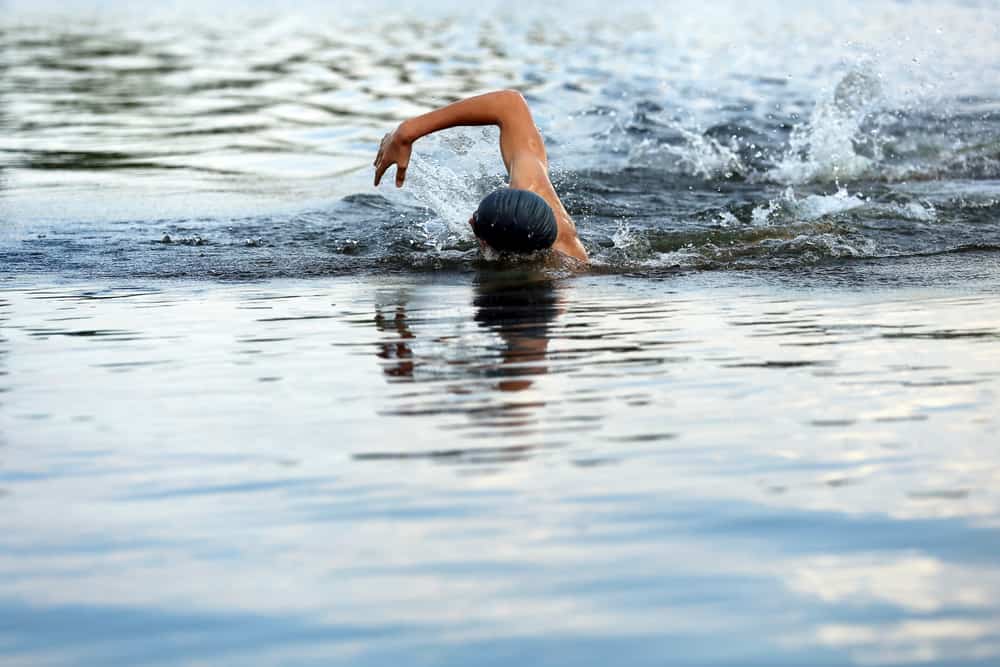Calories Burned Swimming Vs Running: Who do you think burns more calories, Michael Phelps or Usain Bolt?
Both running and swimming are highly effective cardio exercises for losing weight, but they give different benefits. Swimmers often have muscular bodies, while most runners have slim bodies. The common thing between both sports is that they aid weight loss and encourage healthy bodies.
Here, we compare the number of calories burned swimming vs running. So, if the primary goal of your workout is to burn calories, you know which is better for you.

Calories Burned Swimming Vs Running
It’s pretty hard to estimate the number of calories burned in each sport because it varies according to many factors. To know the real difference, you need to have the same variables, such as the intensity, the weather, and the athlete’s weight.
According to a study done by Harvard, running burns more calories than swimming in 30 minutes. The Harvard scientists did the study on three individuals weighing 125, 155, and 185 pounds.
The first individual burned 180 calories while swimming at a leisurely pace and 240 calories running at 5mph.
At the same pace, the second individual burned 223 calories swimming and 298 calories running. Meanwhile, the third one burned 266 calories swimming and 355 calories running.
Although these are real-life results, we can’t build estimations according to them because there are many variables. Plus, people have different metabolic rates, so there’s nothing to say they’d burn the same number of calories as the individuals in the study.
What we can conclude is, running burns more calories because it’s a high-impact exercise. Swimming is low-impact. It engages all your muscles but doesn’t burn as many calories.
Why Go for Swimming?
If you’re choosing between running and swimming, why should you go for the latter? Both sports are equally popular, and they have worldwide communities.
Here are some benefits that may urge you to choose swimming.
Full-Body Workout
Swimming engages most, if not all, muscles in your body. So, you get a full-body workout without feeling it and without exerting too much effort.
Running mainly focuses on your lower body. It doesn’t tone your shoulders, chest, or back muscles. Swimming works on both ends of your body, focusing on muscles in even your arms and ankles.
Safe for Recovery
If you’re recovering from an injury, you can practice swimming. Of course, you need to get cleared by your doctor, but swimming is generally safe for most injuries. It actually encourages healing and helps you keep your muscle mass maintained in the recovery phase.
No Joint Pain
Swimming doesn’t put stress on your joints as running does. Instead, it’s one of the easiest sports on your joints, so it’s a perfect choice for people with rheumatoid arthritis or osteoarthritis. It’s also the choice you should go for if you’re generally prone to joint pain.
Water offers more resistance than air, but it doesn’t hurt your joints or put unnecessary stress on them. Instead, it supports your muscles, allowing you to work out harder with less impact than land.
Versatile
Swimming is a versatile sport. You can change the way you’re swimming as much as you prefer. For example, some swimmers alternate between doing full-body workouts and doing laps. You can also spice up your workout session by using ankle weights or, even better, aqua belts.
If you’re not burning as many calories as you’re planning, you can quickly change the way you’re swimming to optimize your calorie burning. That’s the good thing about swimming; you can’t get bored doing it!
Why Go for Running?
While swimming has some benefits that may tempt you to go for it, running isn’t an easy competitor. The sport has endless benefits, and it has excellent leverage over swimming because it doesn’t get your body wet!
High Rate of Burning Calories
Running turns your body into a calorie-burning machine. In fact, most cardio exercises do, but running burns more calories than both swimming and cycling because your body exerts more effort to do it.
You can optimize your running workout to burn more calories by adding sprints and interval training. Every mile you run faster, you burn more calories.
Convenience
Aside from its high burning rate for calories, running is a convenient sport. You can run anywhere, but we can’t say the same about swimming. You can run indoors or outdoors, in any park, on the streets, or on a race track. Meanwhile, you need a pool for swimming, which isn’t always readily available.
Plus, running doesn’t require equipment. All you need is a pair of running shoes, and you’re good to go. For swimming, you’ll need swimwear, goggles, and a headcover.
Bone Building
Running has an excellent benefit that not a lot of sports offer. It’s a weight-bearing sport, which means it encourages bodybuilding. Because swimming is a low-impact sport, it doesn’t increase your bone density.
Running makes you work against gravity, which helps build your bones and increase their density.
No Chance for Relaxing
If you find it troubling to discipline yourself while working out, running may be the better option for you.
Simply put, swimming makes it more tempting to ditch the training and keep having fun. You can easily relax in the pool and keep floating around without making any effort, and it’s fun, which is a bonus.
In this case, you won’t be burning any calories.
Meanwhile, it’s hard to slack off when your treadmill is going at its highest speed. Running gives you no chance to relax. You have to keep pushing or stop altogether. Plus, if you want to relax and turn to walking instead, you’ll still be working out, and you may burn some calories. On the other hand, as far as we know, floating in water doesn’t burn any calories!

How to Choose the Right Sport for You
If you can’t decide whether to do more swimming or to run, this guide may help you. Determine your current condition and choose the best sport accordingly not only thinking on how much Calories Burned Swimming Vs Running but your overall health.
If You Want to Gain Muscles
Swimming engages more muscle groups than running, so it’s the obvious better choice if your main aim is gaining muscles.
Running can actually cause muscle loss if you don’t do enough strength training. That’s why most marathon runners are slim—because they run too much for their bodies to properly build enough muscles.
Swimming helps you gain muscle mass easily without pressuring your joints or causing pain.
If You Want to Tone Your Upper Body
If your main aim of working out is to tone your upper body, swimming is the right choice for you. Running doesn’t engage most of the muscles in the upper body, so you’ll barely notice a difference unless you incorporate some strength training into your weekly schedule.
If you want to gain more muscular shoulders, back, and chest, go for swimming instead of running. Or, go for running but build a solid plan for strength training.
If You Have Joint Pain
If you constantly suffer joint pain because of arthritis or are overweight, it’d be wise to go swimming. It doesn’t put stress on your joints, and it’s generally gentle on your body. It also has a lower risk of giving you injuries.
Running, on the other hand, is a high-risk sport because of the repetitive movement. You put a lot of strain on your ligaments and muscles. That’s why runners and football players often get more injuries than swimmers.
If You Want to Build Your Bones
If you want to encourage bodybuilding, running may be the better choice for you. It puts extra stress on your bones, promoting healthier bones and increasing their density. Swimming isn’t a good choice for people who want to build their bones because of the hypogravity. However, contrary to common belief, it doesn’t cause bone loss.
If You Want Resistance Training
If you want to build your body’s endurance by doing some resistance training, swimming is your go-to. Although running may help build your endurance, swimming is better for this purpose.
Kicking around in water is harder than running, and it takes more effort. And water provides more resistance than air, so it’s obvious which sport is the winner here.
If You Have an Injury
If you have some sort of injury in your shoulders, swimming is out of the question. It engages all the muscles in your shoulders and puts strain on them. If you’re already injured or prone to an injury, the repetitive motion will eventually have its toll on your muscles.
Meanwhile, if your injury is in the lower body, choose swimming and ditch running. Running will likely cause the injury to get worse because of the repetitive strain. In this case, you can practice swimming for a while or until your injury heals.
Does High-Intensity Swimming Burn More Calories Than Running?

While the previous results showed that running burns more calories than swimming, that’s not true in all cases, if you practice high-intensity swimming, it’ll likely burn more calories than running at a leisurely pace.
When you think about it, burning calories is easier while swimming because the water offers much more resistance than air. Plus, when you engage all of your muscle groups, burning calories is much easier. However, since most swimmers only swim at an easy pace, the calories burnt aren’t significant.
To optimize your calorie-burning rate while swimming, aim at keeping your heart rate at 70%–80% of the maximum.
How to Increase the Number of Calories Burned?
Whether you’re swimming or running, if your goal is weight loss, you likely want to increase your calorie-burning rate. To do that, you may want to try high-intensity interval training or HIIT for short.
HIIT exercises are short but intense. They’re designed to maximize weight loss while decreasing the time you take to work out. So, for example, half an hour of HIIT exercises will burn more calories than one hour of regular exercise.
That’s because the high intensity and the short breaks take more energy out of your body and push it harder. Therefore, your body starts burning more calories to get more energy.
You can do high-intensity training in both running and swimming, but you’ll need to make sure you’re eating enough carbs to give your body the energy to proceed.
The Final Verdict On How Much Calories Burned Swimming Vs Running
The choice between swimming and running is easy if you’re aware of your goals. If you want to build your muscles, avoid joint injuries, and build your body’s endurance, swimming seems like the better choice.
That said, swimming needs a decent fitness level, and it’s not always easy to do because it requires ready access to a pool. Plus, swimming has some disadvantages related to skin and hair care. Swimmers usually have to make double the effort to maintain good hair because the water keeps stripping their skin of its natural oils.
On the other hand, if you want to lose more weight, encourage bone building, and practice your sport anywhere, running is your go-to choice.
You can run anywhere, and running will help you lose a lot of weight. However, keep in mind that running increases your risk of getting injuries. It puts a lot of stress on the joints, so it’s not recommended for people with arthritis.
As for which sport burns more calories, running burns more calories in general. But, swimming burns more calories when it’s at a high intensity. It depends on your working-out style.
